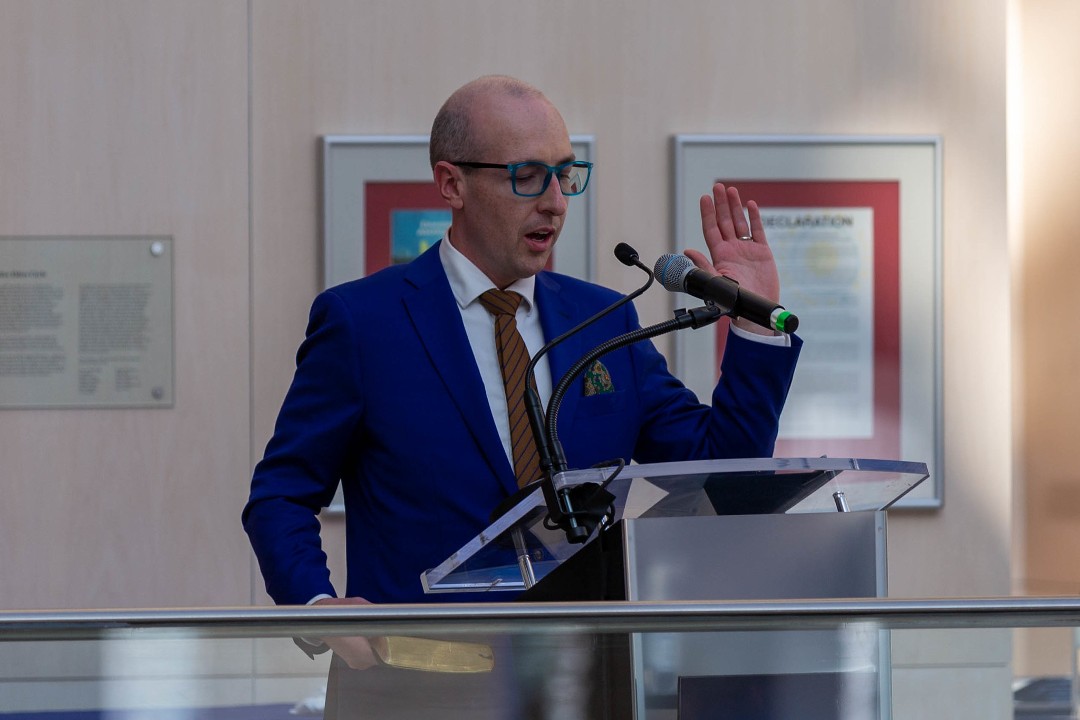One Edmonton city councillor says the United Conservative Party government's Bill 50 could create cascading financial disadvantages for independent candidates running against candidates who are part of a party in the municipal election in October.
"Not only does a political party essentially get to ... raise double compared to somebody that's going to run as an independent, now (that party) can choose to transfer as much of that money as they want over to individual candidates," Coun. Andrew Knack told Taproot. "In Bill 50, (the UCP) have really formalized what I think a lot of people expected."
Bill 50, which passed second reading on April 30, builds on Bill 20, which became law in 2024. The earlier bill allows a municipal party to raise money and lets a candidate of that party raise money individually, essentially doubling the overall amount candidates in wards can raise. Critics have suggested this allows money and those who have it to play an outsized role in elections.
Knack said Bill 50, once passed, will accelerate this trend, as a candidate's party will now be allowed to divert any money it raises for an overall group of party candidates to specific candidates in specific wards, allowing individual races to potentially become flooded by dollars to help a party's candidate to win.
This practice already takes place with provincial and federal parties in their first-past-the-post races and was on display in the recent federal election, where parties invested time and resources in ridings they saw a chance of flipping, such as Edmonton Centre and Edmonton Southeast.
Independent candidates have been the only type of candidate in Edmonton elections since the late 1980s, the last time some candidates belonged to slates such as the Edmonton Voters Association or Urban Renewal Group Edmonton. But Knack said the scenario where a newly minted party devotes resources to beat an independent means that independent candidates face a potential double disadvantage in 2025, while wealthy donors face far fewer barriers to influencing outcomes.
"So, somebody that's running as part of a party gets this distinct financial advantage, and this is at a time where we're seeing in the U.S. billionaires come in and try to influence elections ... and trying to just overpower democracy with money," he said.

Coun. Andrew Knack, pictured here in 2021 after winning re-election to city council, has long voiced concerns with changes to municipal elections introduced by the provincial government under the United Conservative Party, including Bill 50. (Mack Male/Flickr)
Knack's concerns build on years of giving voice to concerns about changes that the UCP government has introduced to municipal elections. But the evidence remains unclear whether those changes exert as much force as potentially intended. As of April, there is just one party formalized for the October vote — Principled Accountable Coalition for Edmonton, otherwise known as PACE. In November, a former party known as TAPYeg announced it was merging with PACE.
And despite Knack's concerns, money and even incumbency have thus far not proven to be insurmountable in Edmonton's municipal elections. In 2017, for example, Jon Dziadyk defeated incumbent Dave Loken in what was then Ward 3, despite only spending a reported $5,500, including just $1,200 in donations, when other winning candidates spent as much as $124,000.
Still, Knack has long taken issue with parties entering municipal politics in general for reasons beyond financial questions, noting parties are governed by party discipline, which could mean councillors become less responsive to constituents who don't align with their party's view. He told Taproot that Vancouver, which has municipal parties, has seen councillors kicked out of their parties when they break discipline. He also noted the UCP kicked Scott Sinclair out of its caucus for taking issue with the recent budget for his constituents.
In April, Alberta Municipalities released an analysis of Bill 50 that echoed many of Knack's sentiments. "ABmunis remains concerned that the implementation of local political parties and the rules regarding the operation of local political parties provides a significant financial advantage to candidates who run under a political party versus independent candidates," the advocacy organization said. "This proposed amendment appears to further broaden that disadvantage."
One day after the federal election, the UCP government released yet another bill with sights on elections and regulations on money being allowed to influence them. Bill 54 proposes many changes to election rules, including removing limits on union and corporate donations to parties, candidates, and political action committees.
Political scientist Jared Wesley suggested the bill is a further Americanization of the province's elections. "In Alberta, the reintroduction of big money into elections risks further skewing the political process toward the interests of the wealthy, while ordinary citizens struggle to be heard," Wesley wrote. He also pointed to research he helped create that showed Albertans are strongly opposed to these changes.
In his recent campaign kickoff speech for the mayoralty, Coun. Tim Cartmell said his forthcoming party, to be called Better Edmonton, will be a "collaborative circle" rather than a whipped party that is kept on message, as we see in provincial and federal politics.
Knack, meanwhile, has said he won't run as a councillor again in Ward Nakota Isga but is considering running for mayor now that Amarjeet Sohi is not running again.
Municipal Election 2025
Taproot wants to know what issues you care about as you consider who to vote for in the 2025 municipal election, and why. The 2025 municipal elections are approaching. Let us know what matters, and read more about what we plan to do with what we gather.
